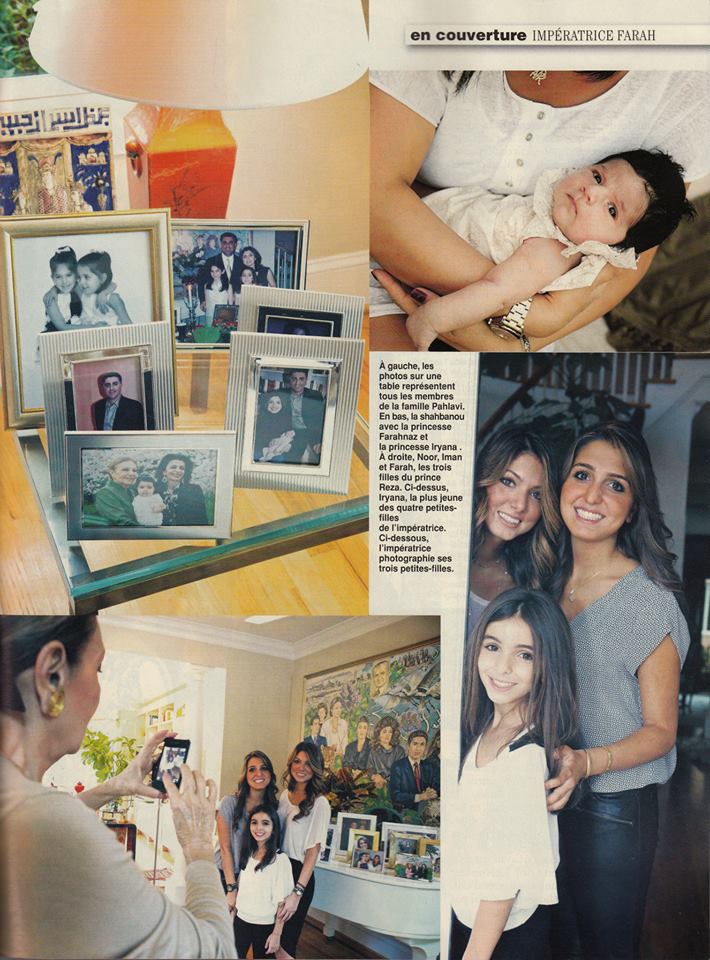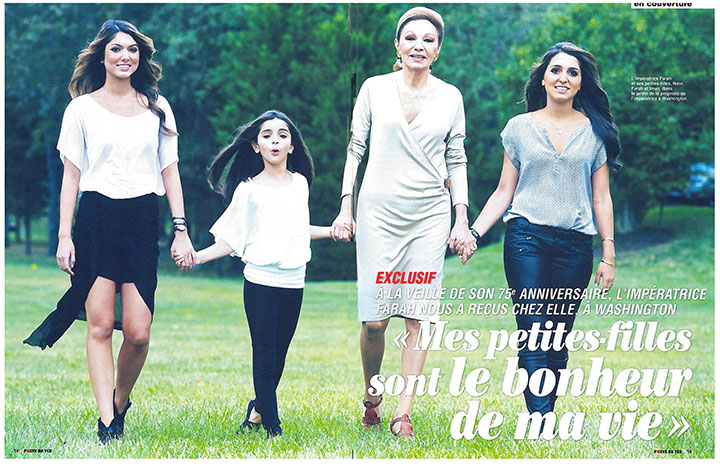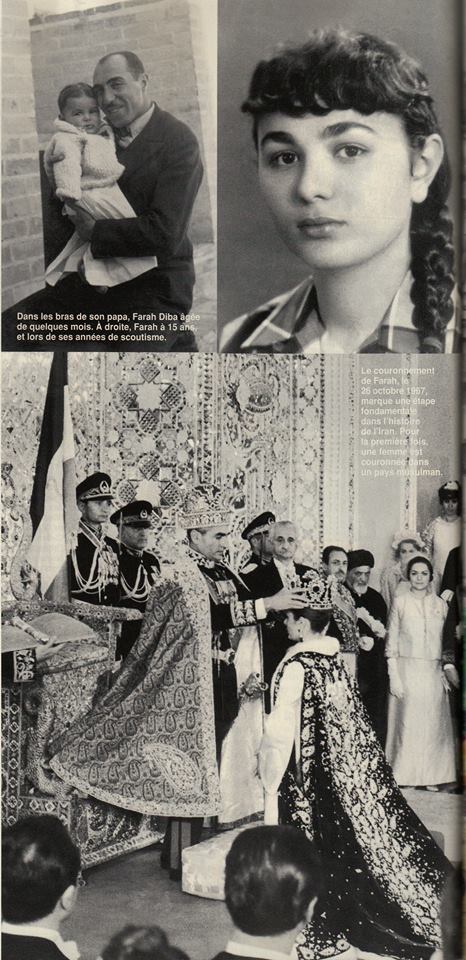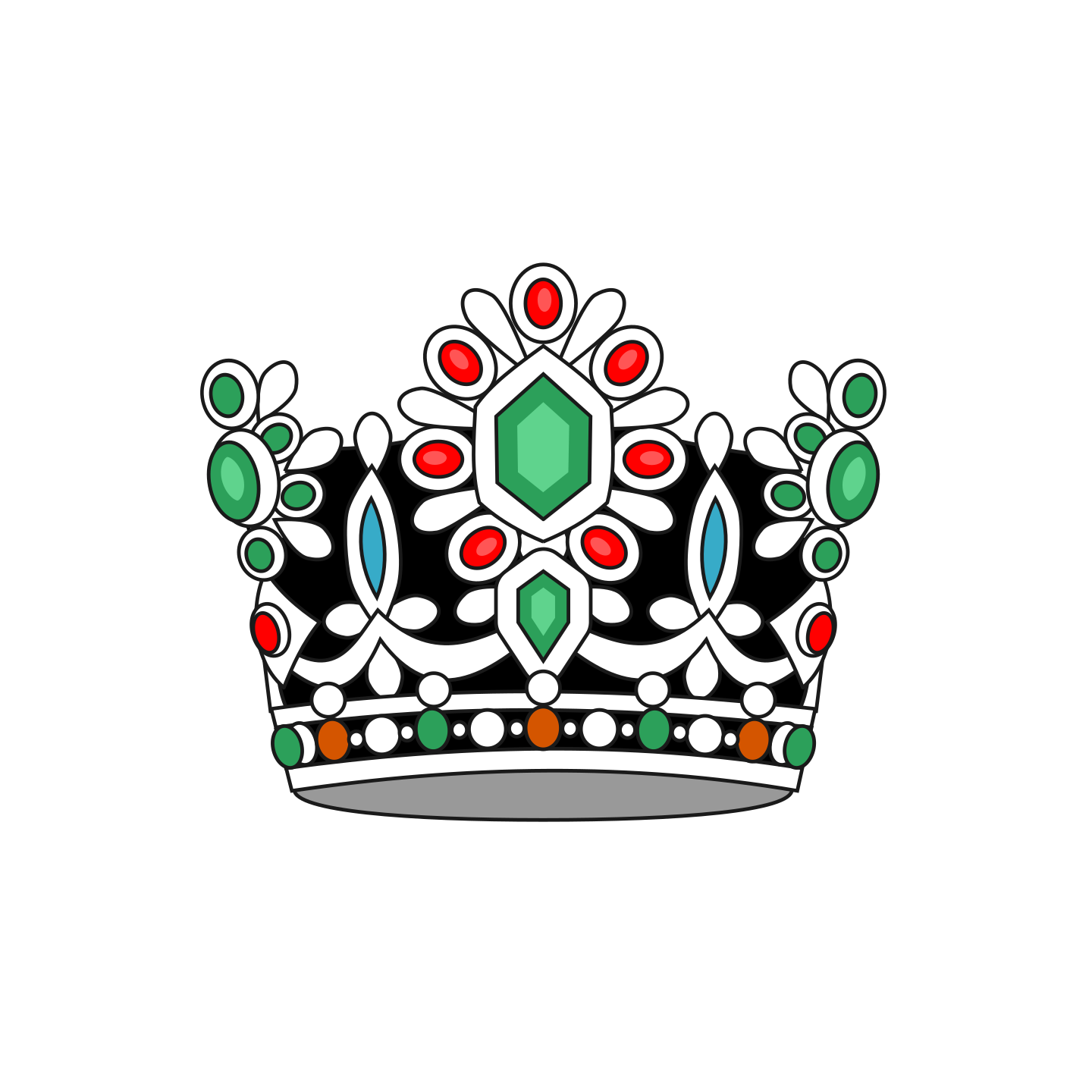
Her Majesty Queen Farah Pahlavi exclusive interview with Point De Vue on her 75th Birthday
75 Years of a life like no other and a contrasted destiny of highs and lows. One of a young Iranian student known as Farah Diba who became Empress, but has known exile, the death of her husband and that of her two youngest children. Shahbanou Farah Pahlavi received “Point de Vue” in her home in Washington. Responding candidly to questions by our correspondent Vincent Meylan in presence of her three grandchildren. A touching meeting with a Lady who has remained both simple and profoundly humane.
If for once history would choose to leave Empress Farah alone. If for once life could be void of tragedies, revolutions and loss. If for once only the future could be the focus of her attention in the presence of her four grandchildren whom the Shahbanou cherishes above all. It’s in Washington that the Empress has chosen to celebrate her 75th birthday on October 14th in presence of her family. A few days ago she had received “Point de Vue” with Noor, Iman and Farah. She expressed her joys of being a grandmother – Iryana, her fourth granddaughter wasn’t present, but the latter had spent a few long weeks in Paris with her royal grandmother. She also spoke about the difficulties to overcome some of the traumas of her life notably the tragic death of her second son Prince Ali Reza.
Point de Vue (PdV): Madam, you are greeting us in presence of your three grandchildren, Noor, Iman and Farah. Could you please tell us more about them?
H.I.M Farah Pahlavi: They are truly along with their cousin Iryana the joy of my life. I have a special relationship with each and every one of them which is a combination of tenderness and mutual trust. The two eldest who is now young grown-up women share with me little things which they don’t necessarily want to tell their own parents. We exchange a great deal of SMS with one another. As for Iryana, she lives with her mother who takes great care of her. She wasn’t able to be here for my birthday but she spent ten days with me in Paris. I was so happy to be able to see and live these privileged moments with her. At times I feel my relationship with my grandchildren seems far less difficult than the ones I had with my own children.
One doesn’t have the same responsibilities. Obviously one asks oneself questions and one worries for their future, but not with the same intensity as with one’s own children. Besides as grandparents we rarely have the last word. We can only love and spoil them. It’s simple and fun.
PdV: You said that your grandchildren idealize you a little?
H.I.M Farah Pahlavi:
Yes, they often send me SMS so as to tell me that I am just too kind with everyone, that I am this or that on a very positive note. At times I feel they see me with far more qualities than I can actually vouch for. But the good thing (she smiles) is that it forces me to live up to it and try not to disappoint them in regard to their image of me.
PdV: Noor, aged 21, Iman aged 20, Farah aged 9 and Iryana aged 2. Could you tell us more about each one of them?
H.I.M Farah Pahlavi:
A grandma is probably not the most objective to speak about the qualities of her grandchildren. I probably am idealizing them also. All four are intelligent and beautiful. If I were to describe them individually, I would say Noor is a young and very sensitive girl with a golden heart. She works very well at the University of Washington, but having chosen to live close with her parents, she clearly has not made a clear professional choice yet. Iman is most certainly more decided. She has found her vocation quite quickly. She has chosen to study economy at the University of Michigan where she has excellent results. She also has a heart of gold. Regarding little Farah, it is too early to define her character yet, all I can say is that for the time being she is a lovable girl. As for Iryana, one thing stroke me while she was spending time with me in Paris last July. She is a very sociable child who eagerly speaks to people even in the streets. In the evening she never went to sleep before I went to see her in her room. She is very cute and more importantly I noticed she is very sensitive to music just like her father at the same age. Music was an essential element in Ali Reza’s life as it is in mine as a matter of fact. I was extremely touched that my son’s daughter born months after his death shares the same taste for music as her father.
PdV: You expressed several times your frank relationship with your grandchildren? Do you think they realize who was their grandmother?
H.I.M Farah Pahlavi:
Absolutely, yes the two elders are fully aware but maybe I should try to let them know more about what this era represented for Iran. They have never lived in this country and have not known their grandfather.
PdV: Do you understand this generation? It’s tastes, their desires?
H.I.M Farah Pahlavi:
There are things that haven’t entirely changed since my time some 60 years ago. They are sportive, and very stylish. I myself was more sportive and probably more of a tomboy at their age. I became stylish later. I have always encouraged them a great deal to do sports, they practice ski, swimming, tennis and scuba diving with their father. They speak English, Persian of course and a little bit of French, because Iman and Noor started off their schooling in a French school in the United States. They obviously speak to me about their studies, they share with me their secrets. When they were younger I tried to expose them to the type of music I love but probably that wasn’t enough. I have very eclectic tastes. I love all sorts of music from Persian folklore to classic music as well as African rhythms and even some Iranian rap singers whom I listen to on Iranian radio stations. Clearly my grandchildren appreciate more contemporary music corresponding to their age and generation. But I have had the opportunity to go with them to concerts. I don’t know if I always understand their tastes but it’s not important since what matters is that they trust me and they know that I love them dearly. I tell them always: “what matters is that you find what you like in life and that you find accomplishments in your professional and private and sentimental lives. The rest is of less importance.”
PdV: Could the eldest Princess Noor become the heir to the Pahlavi Dynasty?
H.I.M Farah Pahlavi:
All this is very hypothetical, but we never know. She is the eldest of my eldest son’s children and he is currently the heir to the throne. If one day a Constitutional Monarchy is restored, this would be a strong symbol particularly for Iranian women who have endured so much all these years, to see a woman be named heir to her father as well as heir to the throne. It is currently the case in Sweden, the Netherlands, or in Belgium today so why not in Iran tomorrow? All the more that this wouldn’t be the first time a woman ascended the throne in our country. We even have had ruling queens in the past. However at this juncture what matters is to see her good in her skin just like her siblings and cousin, and to see that she studies well and is happy.
PdV: You mentioned Princess Iryana who was born several months after the tragic death of her father, prince Ali Reza who committed suicide on 4th of January 2011. Have you ever spoke about it again since?
H.I.M Farah Pahlavi:
It is very difficult for me as for any other mother who has experienced this to speak about the death of one of her children particularly after the death of my daughter Leila in 2001. I am not sure to be able to find the words to explain prince Ali Reza’s gesture. He had many personal problems in his life. Some people took advantage of him and hurt him. Like princess Leila he had a very painful teenage at one of the worst periods of the Iranian revolution and during our exile. The two eldest of my children Reza and Farahnaz already had a stable personality when all this turmoil hit our lives. The two youngest were far more sensitive and fragile at the time. They never quite overcame the shock despite the passage of time.
Ali Reza had problems linked to depression when suddenly this … (the Empress hesitates) moment, I don’t know how to qualify it, happened. An “accident”, a moment of depression which was more violent than other moments … I don’t know. It is something very hard, actually impossible for a mother to admit, I am not even sure the term is correct to describe the death of one’s child.
Ali Reza had problems linked to depression when suddenly this … (the Empress hesitates) moment, I don’t know how to qualify it, happened. An “accident”, a moment of depression which was more violent than other moments … I don’t know. It is something very hard, actually impossible for a mother to admit, I am not even sure the term is correct to describe the death of one’s child.I always blame myself for not having done this or that but I know it doesn’t help. I often think of their childhood in Iran, during our years in exile. There are certainly things that I did not notice at the time, moments where I was less present, yet I had a warm, constant and loving relationship with my children even during the Imperial years when we were in power and when I was very busy. I don’t know … when I am discouraged, or I feel that sadness is taking over me, I try to find courage by telling myself that I have to remain strong and available to those who are still with me today: Reza, Farahnaz, and my grandchildren.
PdV: Precisely. We never speak about her, nor do we see her in the press, but what can you tell us about your eldest daughter Princess Farahnaz ?
H.I.M Farah Pahlavi:
She is doing all right, thank God, thank you. I’m so lucky to have her. We speak to each other often. She has an important role in my life and our family life in general. She is really very close to her elder brother Reza, her nieces and particularly the little Iryana. Farahnaz is a woman of extraordinary character. She doesn’t have the slightest aggressive trait in her character. Her brothers had dubbed her “Mother Teresa”. She is very smart. She did some serious studies. She has friends, a quiet life which she protects and wants to keep very private. We call each other often.
PdV: And your son, Prince Reza?
H.I.M Farah Pahlavi:
He is the one who has the most difficult role. Especially with everything that is taking place today back home in Iran. He works hard and is doing all in his power to help free his country and fellow compatriots. Fortunately he has a very positive character, which allows him to overcome many challenges.
PdV: When you see this new generation of your grandchildren what would you like to transmit to them?
H.I.M Farah Pahlavi:
The most important I think is not to hold any bitterness inside oneself. It is important to try and see what is positive in life. Heaven knows how hard it has been for me to apply this motto to myself. It’s true that life has become very complicated today. When I think of my childhood, I tell myself that I have remained the girl scout I used to be when I was 15. I have kept the same ideals. I try to be as caring despite the hardships of life. At times it’s been hard but I don’t think I was wrong. It’s these ideals which I try to pass on to my granddaughters. They often admonish me by telling me: “You are too nice with everybody all the time.” But I don’t think I am too kind. I try to be most of the time but I don’t always manage. It’s important for me and it helps. To be kind doesn’t mean just anything, it means doing good and trying to give as much love as we can to others. If some think it sounds a little simplistic a philosophy in the world we live in … so be it. At my age it’s too late to try and change anyhow. I know that by giving I am also rewarded in return.
After 34 years in exile I am always extremely touched to receive letters or mail from young compatriots both inside and outside Iran. Many were born after the fall of the Monarchy and yet they recognize me and write to me with such kindness and warmth and ask me to call them back. It’s also to them as well as to my grandchildren that I try to transmit my optimistic outlook on life. There are so many things in life that can give us positive energy. I don’t live in the past and I don’t isolate myself.
PdV: Is this because of your character or education?
H.I.M Farah Pahlavi:
Probably both. Whether it’s the education one receives from one’s parents or the one we get at school. When I think of my youth or the education I got some 60 years ago I thank my parents and especially my mother who gave me this opportunity. The freedom of being able to go abroad and study in France was a blessing. I think it’s this education which she transmitted me which allowed me to remain normal and free throughout my extraordinary life.
PdV: Don’t you think you also have a remarkable ability to adapt yourself?
H.I.M Farah Pahlavi:
Probably both. Whether it’s the education one receives from one’s parents or the one we get at school. When I think of my youth or the education I got some 60 years ago I thank my parents and especially my mother who gave me this opportunity. The freedom of being able to go abroad and study in France was a blessing. I think it’s this education which she transmitted me which allowed me to remain normal and free throughout my extraordinary life.
PdV: Don’t you think you also have a remarkable ability to adapt yourself?
H.I.M Farah Pahlavi:
(The empress laughs). It’s true that my life has been anything but ordinary. My childhood in Tehran in the 50’s, my student years in Paris, my life as Queen, the revolution and then exile … you are correct, I must have had an ability to adapt myself to each situation. It is fortunate that I had this ability. I also think what has helped me in the past as it does today is a sense of humor. For instance when I take the plane or train and have to be controlled by security just like everybody else. When I take off my shoes, I think of how I was treated with respect in the past when upon arrival in China or at the British Court, a Red Carpet would greet me down the lift to the national anthem and guards of honor. I like to compare the two lives I have had : the one as Queen and the one I have today. The fact that I had 20 years of a deemed “normal life” before becoming Queen probably has helped me greatly to accept these changes.
PdV: When you look back at your life after 75 years, which event comes to mind as the most important to you?
H.I.M Farah Pahlavi:
The most important moment in my life? Without a shadow of doubt my wedding. It’s probably the major event which radically transformed my life forever. I had an extraordinary rich and eventful life and I owe it entirely to the King. When I think of my first encounter at the Iranian embassy in Paris, I never thought it would change my life. Our wedding took place on the 21st of December 1959. Strangely enough I remember it much better today than I did several years ago, probably because I wrote my memoirs. I vividly remember waking up in my uncle’s house where we used to live in the north of Tehran. I also remember the long preparation of my hairdo and dress, of the moment I set free the doves as we left my uncle’s house. Of the trip in the car to the Marble Palace and of the people applauding as we drove along the road. Today I tell myself that this was indeed the major event of a life which was indeed particularly extraordinary.
By Vincent Meylan (All photos © David Atlan & © Point de Vue)
Translation: courtesy Darius Kadivar – Paris






